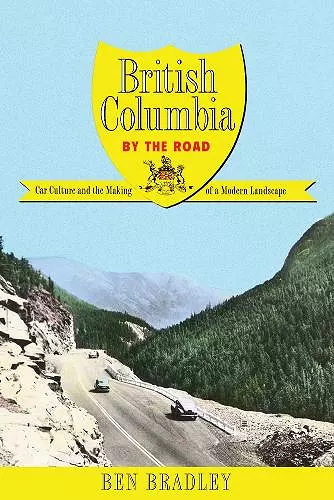British Columbia by the Road
Car Culture and the Making of a Modern Landscape
Format:Hardback
Publisher:University of British Columbia Press
Published:15th May '17
Currently unavailable, and unfortunately no date known when it will be back

The definitive study of automobility and how it has influenced regional perceptions not only in British Columbia but also elsewhere in North America, if not worldwide. -- John A. Jakle, co-author of The Garage: Automobility and Building Innovation in America's Early Auto Age In this book, "beautiful" and "British Columbia" go together like a licence plate and a car. Bradley reveals how a mid-twentieth-century coalition of promoters provided scenic roads and outdoor history museums for the newly emerging motoring public. -- Thomas Zeller, University of Maryland, author of Driving Germany: The Landscape of the German Autobahn, 1930-1970 We know little about the history of automobility in Canada. Full of compelling stories, images, and anecdotes, this look at roadside attractions invites us to think historically about communication lines and how they are embedded in the places, spaces, and memories with which we live. -- John C. Walsh, historian and co-editor of Placing Memory and Remembering Place in Canada
Although cars and roads promised freedom, they offered drivers a curated view of the landscape. This book takes readers on a journey through the history of roads, highways, and motoring in British Columbia's Interior, a remote landscape composed of plateaus and interlocking valleys, soaring mountains and treacherous passes.
In British Columbia by the Road, Ben Bradley takes readers on an unprecedented journey through the history of roads, highways, and motoring in British Columbia’s Interior, a remote landscape composed of plateaus and interlocking valleys, soaring mountains and treacherous passes.
Challenging the idea that the automobile offered travellers the freedom of the road and a view of unadulterated nature, Bradley shows that an array of interested parties – boosters, businessmen, conservationists, and public servants – manipulated what drivers and passengers could and should view from the road.
When it came to roads and highways, planners and builders had two concerns: grading or paving a way through “the wilderness” and opening pathways to new parks and historic sites. They understood that the development of a modern road network would lead to new ways of perceiving BC and its environment. Although cars and roads promised freedom, they offered drivers a curated view of the landscape that shaped the province’s image in the eyes of residents and visitors alike.
Read British Columbia by the Road backwards. Or forwards. It doesn’t matter. Like the highways themselves, you can drive Ben Bradley’s bright, engaging work on automobility, identity, and landscape in British Columbia’s Interior in different directions. Stop to visit an open-air museum or take a picture of a striking vista. You’ll get to where you’re going.
-- Blair Stein, University of Oklahoma * BC Studies, Issue 199, Fall 2018 *Through refreshing and in-depth research, author Ben Bradley … offers up an engaging road trip through time and space, guiding the reader along the twisting, turning, climbing, curated, landscape of the circa 1925 to 1970 British Columbia Interior highway system, where myriad man-made, natural, and historic vistas unfold…. British Columbia by the Road is delightfully interactive, in that the author encourages the reader to slip behind the wheel … [and] an excellent read, [that] serves to shed light on the numerous forces and underpinnings which were at play in the development of the BC Interior highway system. -- David P. Stephens * Material Culture Review *
Bradley’s study offers fresh perspectives on tourism promotion, park development, political culture, and public history. Befitting a study focusing on driving’s visual culture, the book has superb maps and photographs … British Columbia by the Road provides a much-needed and sustained analysis of key developments in the province’s interior and is clearly a “must read” for BC historians. For those less engaged and less familiar with the province’s history, it offers valuable and nuanced insights into the political, environmental, and economic history of North America—particularly the regional impact of automobility.
-- Michael Dawson, St Thomas University * Histoire Sociale/Social History *[British Columbia by the Road] succeeds admirably in achieving its goals and it will be of interest to a wide variety of scholars far beyond the bounds of British Columbia … the book is a terrific example of detailed, very placeful historical geographical research which succeeds in connecting western Canada’s particular story with a broader argument about how political imperatives, infrastructure investment, and the new technology of the automobile conspired to shape the economic geographies and place identities of many localities across North America and beyond. -- William Wyckoff, Montana State University, USA * Journal of Historical Geography *
One of the ways that we experience our past is by driving through it. We hop into our automobiles and motor through the backcountry, stopping along the way at a wide variety of historical markers, parks, and viewpoints to refresh our memories or learn something new. This “public pedagogy” goes a long way to informing the ideas we have about our province’s history and it is the subject of Ben Bradley’s new book … British Columbia by the Road is refreshingly free of jargon and smoothly written; it also presents a thought-provoking new perspective on the history of B.C.’s interior.
-- Daniel Francis * BC Booklook *Ben Bradley’s book British Columbia by the Road is a significant contribution to the history of North American automobility … [This] is a highly readable book that can be read not only for its academic merits, but also as a travel book!
-- Maude Flamand-Hubert * NiCHE (Network in Canadian History & Environment) *Bradley shows that a regional focus can be an effective way to connect landscape, environmental, tourism, and mobility history.
-- Review by Kyle Shelton, Rice University * Pacific Northwest Quarterly, Volume 109, Number- Winner of Lieutenant Governor’s Medal, Historical Writing Awards, BC Historical Foundation 2017 (Canada)
ISBN: 9780774834186
Dimensions: unknown
Weight: 600g
324 pages